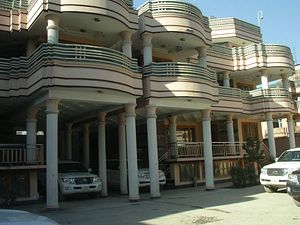The increasingly infamous Task Force for Business and Stability Operations (TFBSO), a U.S. Department of Defense division, is again the target an inquiry by the Special Inspector General for Afghanistan Reconstruction (SIGAR), which says TFBSO spent nearly 20 percent of its budget on villas and private security for its employees.
The unit’s mission, per comments from its former head, Paul A. Brinkley, in 2011 was capitalism: “We do capitalism. We’re about helping companies make money.” SIGAR is not the first to critisice the unit, which was closed at the end of 2014. Congresswoman Betty McCollum questioned in 2011 when it became the Defense Department’s job to “facilitate business opportunities for Afghan and foreign companies?” She noted that while economic development was key to Afghanistan’s stability, “it is the role of civilian agencies like USAID, the Department of State, or the Department of Commerce.” In 2007, when TFBSO’s focus was on Iraq, State Department officials slammed the unit’s initiatives as “antithetical to free-market reforms.” Writing for the Washington Post, Rajiv Chandrasekaran called it a “bureaucratic knife fight.”
The heart of SIGAR’s mission is tracking down how monies appropriated by the U.S. government for Afghanistan’s reconstruction have been spent. This hasn’t made SIGAR many friends in Washington.
In a letter to Secretary of Defense Ashton Carter, released today and dated November 25, SIGAR questions the decision of TFBSO to spend nearly $150 million on private housing and guards rather than have staff live on U.S. military bases. This decision, SIGAR says, appears to have been made by Brinkley, who in his 2014 book wrote:
Our goal was to get businesses running and to encourage private investors and corporations from outside of Afghanistan to engage in the country either as trading partners or as investors. Wherever possible, we avoided depending on the military. We were part of their mission . . . but we avoided living on military bases whenever possible. The goal was to show private companies that they could set up operations in Afghanistan themselves without needing military support.
If TFBSO’s goal was showing private companies they could set up in Afghanistan without military support, it’s a rhetorical distinction and a ridiculous fantasy.
According to TFBSO contracts cited by SIGAR, the unit spent millions for armed support, including “20 security teams to support operations in all areas of Afghanistan and secure movement of Task Force staff, senior businessmen, and guests…” as well as 24/7 security at the private residences. The villas in question included queen-sized beds, flat-screen TVs, mini refrigerators, and 3 star meals. A former TFBSO official told SIGAR that the villas supported “no more than 5 to 10” staff most of the time.
The core of SIGAR’s letter is not so much that TFBSO’s expenditures were necessarily not valid–though that might ultimately be the conclusion and is certainly the tone of the letter–but rather that the Pentagon has not adequately justified the costs. The letter ends with a series of questions about whether TFBSO prepared cost-benefit analyses regarding renting private villas and who paid for what. Further, SIGAR seeks clarification on what benefits were derived from the investor visits cited by TFBSO as the reason for maintaining separate housing. External consultants have touted the “freedom of movement” enjoyed by TFBSO staff, but SIGAR points out that such praise comes without asking the question of whether the unit could achieve its goals while utilizing base housing.
SIGAR also look aim at TFBSO last month, questioning why the unit spent over $42 million (86 times more than estimated) on a compressed natural gas (CNG) station in Sheberghan. But answers aren’t likely to be forthcoming in either case. The Pentagon said in reference to the CNG station inquiry that it can’t provide details because the closure of TFBSO resulted in the department “no longer possessing the personnel expertise to address these questions or to assess properly the TFBSO information and documentation retained by WHS in the OSD Executive Archive.”

































